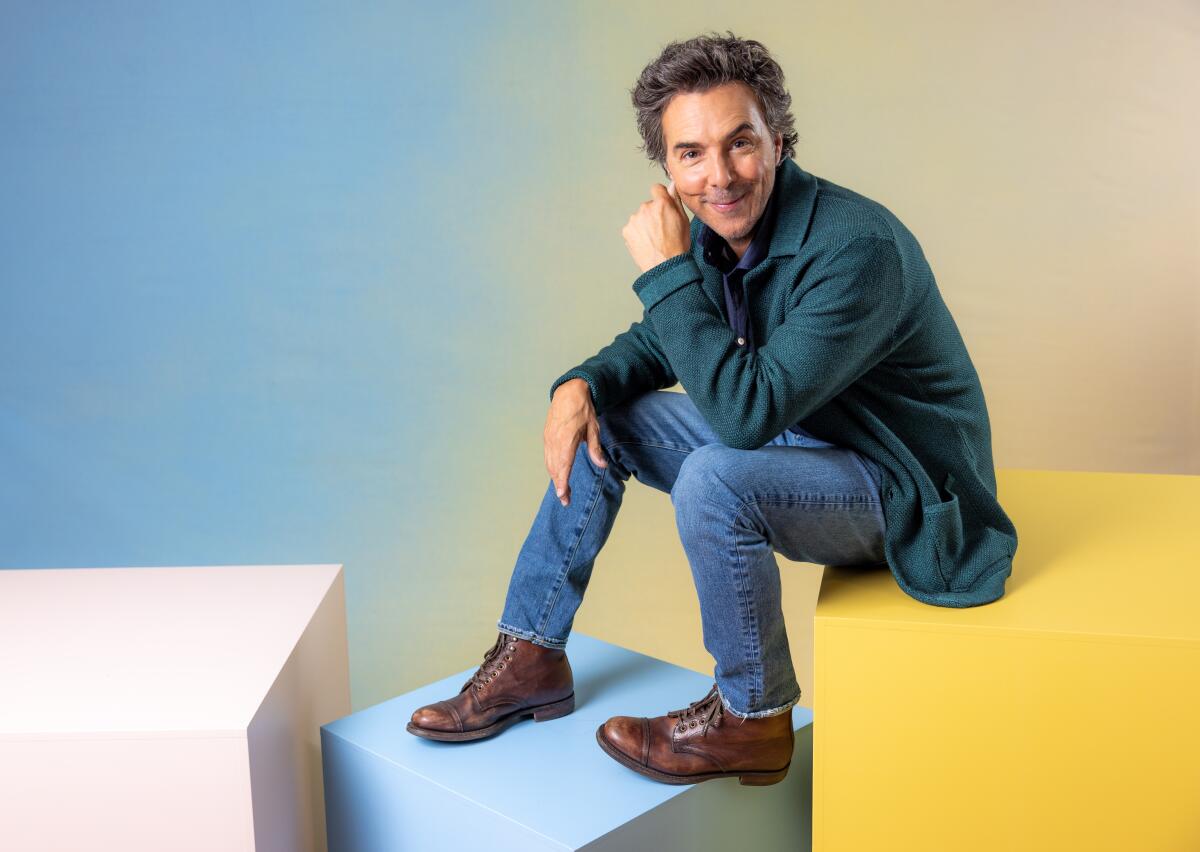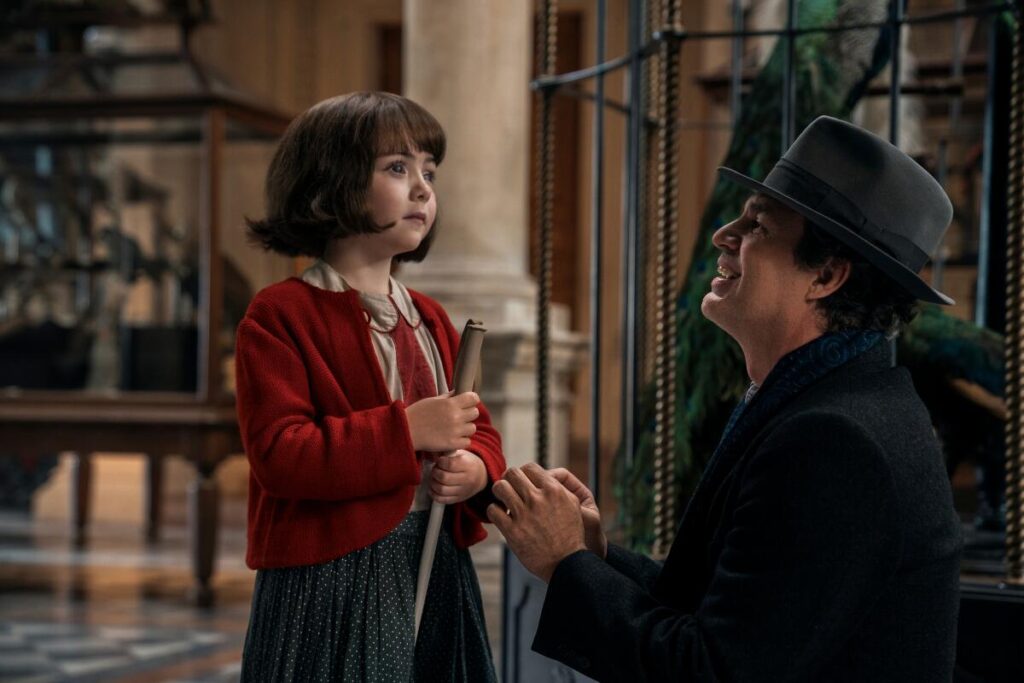Amid the bombed-out streets of a picturesque French village, blind teenager Marie-Laure, her kindly poppa, an agoraphobic resistance fighter, a young German soldier and one sadistic Nazi cross paths in the sprawling World War II saga “All the Light We Cannot See.” Anthony Doerr’s bestselling novel, thickly plotted with time jumps, philosophical musings, supernatural diamonds and secret radio transmissions, won the Pulitzer Prize in 2015. Four years later, director-producer Shawn Levy (“Night at the Museum,” “Stranger Things”) and his 21 Laps Entertainment company acquired the rights and enlisted “Peaky Blinders” creator Steven Knight to adapt the book as a limited series for Netflix. Released earlier this month, the four-episode “All the Light We Cannot See” struck a chord with audiences, opening at No. 1 in the streamer’s Global Top Ten list of most watched shows.
The cast includes Mark Ruffalo, Hugh Laurie and Louis Hofmann, but it’s the show’s previously unsung stars who make the most striking impressions. Speaking from London, Knight now writing the next “Star Wars” movie, and Levy, in town to direct “Deadpool 3,” explain how they pulled breakthrough performances from a blind Fulbright scholar, a little girl from Wales and a German actor renowned in Europe for his avant-garde “Hamlet.”
Aria Mia Loberti, who is blind, portrays the show’s hero Marie-Laure with bravado to spare, yet she’d never acted before “All the Light We Cannot See.” How did you find her?
Shawn Levy: We put out an open casting call on the internet where anyone could send in an audition, and one of them was Aria, a PhD candidate in forensics. She had no idea what she was doing as an actor, yet the fierceness of her intellect made me confident that I could teach her how to act for the camera. I didn’t count on the extent to which she would teach me about her experience as a person who was blind.
So you learned a few things as well?
Levy: I learned how Aria mapped space. She uses her feet to feel the edge of a rug, an uneven floorboard, brick that’s laid slightly askew. Aria’s so smart, if she walks a space once, between her tactical experience and the way sound bounces off of objects, she maps that instantly to memory.
What about close-ups?
Levy: I gave Marie a note once on how active her brow was being in a take, and she said, “Shawn, I’ve never seen my face, so you need to be my mirror. You need to tell me every detail of what you want my face to be doing, because I’m not conscious of it the way a sighted person would be.” That’s a profound difference in process. I’m a dozen movies into my career, and this was not like any shoot I’ve ever done. It was life-changing.
Steven, did you envision Marie being played by a blind person when you wrote the script?
Steven Knight: That decision was made collectively, early on. I’d written the first couple episodes when we cast Aria, and in her auditions I saw there was no attempt to elicit pity or sympathy or even empathy. Seeing that strength on the screen helped me write stuff where it’s not a blind person being blind; Marie’s just a person doing what she does in this terrible situation where everyone’s life is in jeopardy.
Aria holds her own opposite the very experienced Mark Ruffalo, who plays her dad, Daniel, and Hugh Laurie in the role of her great-uncle Etienne. How did you get these styles to mesh?
Levy: Hugh plans what he’s going to do and delivers every take. Mark needs more exploration and doesn’t want rigorous planning. I think one reason Aria got so good so fast is that she borrowed pages from both their playbooks.
Nell Sutton from Wales, also blind, portrays young Marie in the 1934 flashback sequences. With her bob haircut, little outfits and sparkling expression, she’s kind of adorable.
Levy: Unbearably cute. Nell’s actually the first person we cast, before Aria, before Mark and Hugh Laurie. When we Zoomed, I was smitten by her effervescence and knew — boy, oh, boy — her inherent lovable quality would bring us out of the gate in episode one with strength.
Nell Sutton plays young Marie-Laure, with Mark Ruffalo as her father, in “All the Light We Cannot See.”
(Atsushi Nishijima / Netflix )
Marie’s nemesis, Nazi officer Von Rumpel, couldn’t be more ruthless. Steven, what did you have in mind when you wrote that French cafe scene where Von Rumpel slurps oysters while tormenting the poor waiter?
Knight: It’s World War II. There is no gray area. There is good and bad, and people like Von Rumpel are bad. I wrote scenes to make that point as clearly and literally as possible.
Levy: Credit to Steve for writing that scene and also to Lars Eidinger who plays Von Rumpel. I don’t know if we would have found him if my friend Adam Driver hadn’t tipped us off.

“We’ve tried to take Tony Doerr’s beautiful novel about empathy and connection and [show] the need to be spirited in your protection of humanity,” says Shawn Levy.
(Jay L. Clendenin / Los Angeles Times)
What?
Levy: I called Adam to see if he’d want to play another villain after years of Kylo Ren. He said, “No, but I’m working with this German actor on the new Noah Baumbach movie ‘White Noise,’ and you’ve got to check him out, because I can’t stop watching this guy.” So I reached out to Lars and literally within four lines of the oyster scene, we knew he’s our guy. Such menace! But later he finds nuance in this villain character that surprises us.
You shot most of the show in Hungary when Russia invaded Ukraine, right?
Levy: Yeah, and we ended up having Ukrainian refugees playing French refugees in the invasion of Paris sequence. The echoes of history weren’t just subliminal, they were literally in front of me in the form of several hundred extras who, like their characters, were fleeing an invading neighbor from the east.
That must have given you pause?
Levy: It’s all given me pause. We were weirdly topical when we shot this show, and yet again, in releasing it we’re hauntingly timely with yet another war raging. We’ve tried to take Tony Doerr’s beautiful novel about empathy and connection and [show] the need to be spirited in your protection of humanity in the midst of inhumanity.

